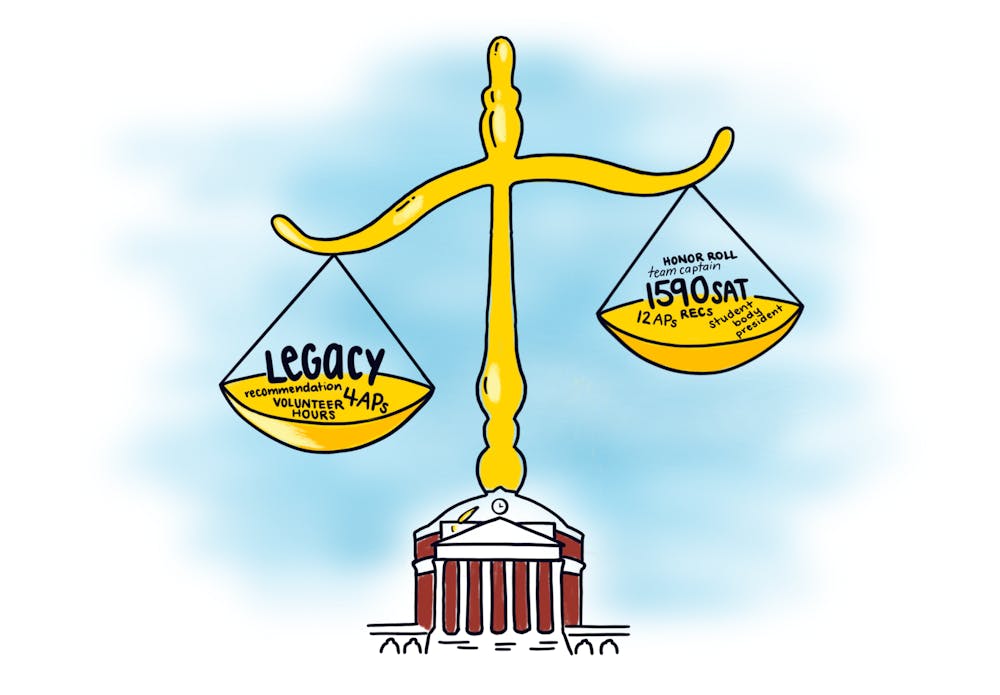Kudos to our Virginia Legislature. They have finally taken an important step to address a persistent inequity in the college admissions processes — the Virginia House of Delegates and the Virginia Senate unanimously voted to end preferential treatment for legacy applicants. In doing so, legislators from both sides of the aisle recognized the intrinsic unfairness of a system in which the often-privileged children of alumni are given preference in the college admissions process simply because of their connections. For Virginia, this bill is a necessary step towards greater accessibility in higher education, one that builds upon precedents set by other states. It is a step which we, as students, and the University, as an institution, should commend for its insistence on more equitable admissions processes.
Following the Supreme Court’s ruling last year which banned race-based affirmative action in admissions, there has been increasing national scrutiny around legacy admissions. Legacy preferences started in the 1920s as a way to maintain the dominance of white Anglo-Saxon Protestants in elite schools by excluding Jewish, immigrant and other minority applicants who were unlikely to have familial connections to universities. To this day, legacy remains a bulwark against establishing greater diversity on college campuses. In giving such preference to a group who tend to be wealthy, legacy admissions privilege a group who have already had the advantages of private tutoring and greater access to extracurricular opportunities. And these advantages are not marginal — for example, at Harvard, the legacy admission rate averages 33 percent, more than five times the rate for non-legacies. In short, legacy admissions have long been a tool of the already affluent and privileged to further increase the inaccessibility of college.
Despite such a reality, many have historically and continue to support legacy admissions on the basis that legacies donate more to their alma maters. However, recent studies show no statistically significant evidence that legacy preferences make alumni more likely to donate. Proponents also argue that legacy admissions helps to inculcate school spirit. In reality, this assertion is misleading — a study at Harvard found that school spirit was largely consistent irrespective of legacy status and was, in fact, slightly lower among legacy students. Nevermind the fact that there are several other ways, including celebrating diversity, that can inculcate school spirit without giving advantage to the already advantaged. Despite these clear rebuttals to common arguments, however, many schools continue to rely on a status quo in which legacy admissions is normed.
Such a persistent norm makes legislative bans doubly necessary. Virginia is not the first state to realize the profound inequity of this system and attempt to ban it through law. In 2021, Colorado banned legacy admissions from their public universities. Moreover, none of the public universities in California campuses use legacy-preferred admissions. Even Virginia Tech banned legacy admissions in August 2023 — we can’t let the Hokies be ahead of us on the equitable admissions front. And right now, other states, such as Massachusetts, are considering banning this practice as well.
Especially at our own University, a legal ban may be the best way to restore genuine equity in admission processes. The University, instead of banning legacy admissions outright, continues to skate around the issue. Last year, the University removed the legacy checkbox on the Common Application. However, they simultaneously added an optional essay prompt that gave students space to elaborate on their personal or historical connection to the University. President Jim Ryan described this prompt as a way to combat the Supreme Court decision on affirmative action by expanding legacy admissions to include descendents of the enslaved laborers who built this University and the indigenous people displaced by it.
In reality, however, the University’s invitation for students to share their connection to this institution is simply further proof of how the status of legacy admissions continue to stain our institution. Not only did this prompt explicitly include applicants whose relatives were alumni of the University, it also neglected to take into account the historical erasure that has been committed against both enslaved laborers and indigenous people. Both of these groups have been systematically excluded from the historical record, making it unlikely that prospective applicants will even know of a connection. Thus, while we applaud the University’s removal of the legacy checkbox, ultimately, the new prompt likely gives more support to the children of legacies than to the descendants of groups marginalized by the University. It is this exact sort of round-about perpetuation of legacy admissions which the Virginia law will hopefully illegalize.
Legacy admissions structures persistently perpetuate a dated status quo that is white and affluent. No institution of higher education should employ such structures if they are genuinely committed to improving the accessibility and diversity of their institution. Our own University says it stands for progress and diversity, yet its actions speak to continuing the primacy of the privileged. Other states and schools recognize the injustice of prioritizing the children of wealthy alumni. And our legislature has now taken a momentous step towards formalizing a policy against such discriminatory structures. We, as students, applaud this bill that will finally put an end to a system that values last names over inclusion and accessibility.
The Cavalier Daily Editorial Board is composed of the executive editor, the editor-in-chief, the two opinion editors, their senior associates and an opinion columnist. The board can be reached at eb@cavalierdaily.com.







